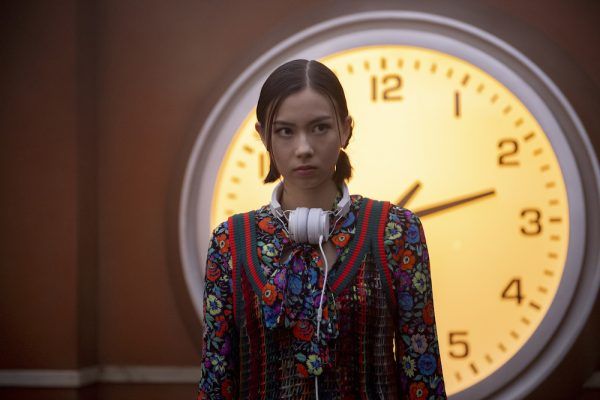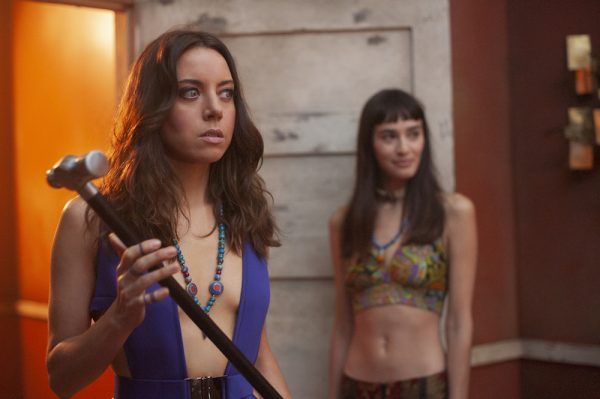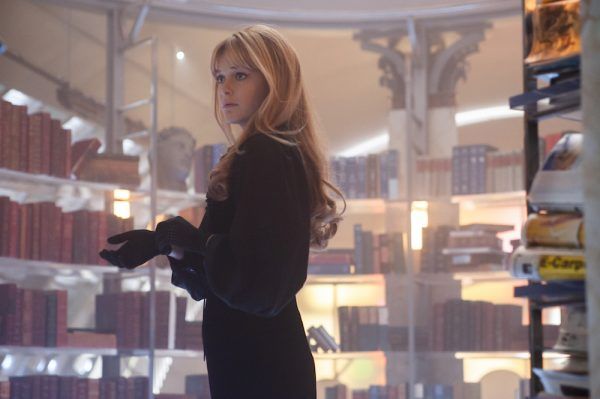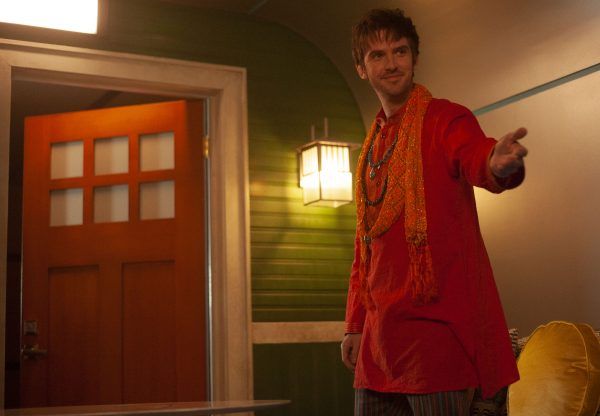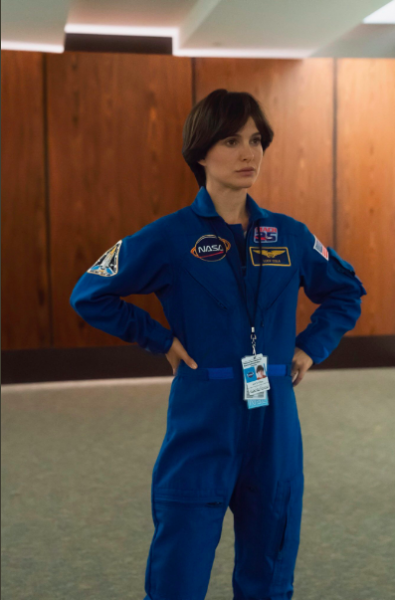From show creator Noah Hawley and Marvel Television, the FX drama series Legion is back for its third and final season, as David Haller (Dan Stevens), a man who believed himself to be schizophrenic only to discover that he is the most powerful mutant the world has ever seen, is forced to confront his actions and the decisions that he’s made. With the dark voices in his head lusting for power and at odds with everyone he once considered a friend, David is now leading a commune to satisfy his need for adulation and he’s enlisted the help of the young mutant Switch (Lauren Tsai), with the hope that she can help him time travel and repair the damage that he’s caused.
While Season 3 was still shooting, Collider got the opportunity to tour the incredible sets at Paramount Pictures in Hollywood and participate in a series of interviews to talk about all things Legion. Here are the highlights from what showrunner/writer/director/executive producer Noah Hawley had to say, during both a group interview on set, as well as in a 1-on-1 prior to that, where he talked about how it feels to end the story on his terms, testing the bonds of the audience to their hero, whether David Haller is redeemable, the David-Syd (Rachel Keller) relationship, exploring the damage that was done in his childhood, bringing in Charles Xavier (aka Professor X), his collaborative relationship with Dan Stevens over three seasons, working with him again on his feature directorial debut Lucy in the Sky, juggling the final season of Legion with Season 4 of Fargo, and what fans can expect from that show. Be aware that there are some spoilers discussed.
How does it feel to know that you’re telling the end of the story, the way that you wanted to tell it?
NOAH HAWLEY: It’s good. I love endings. What’s great about telling a story with a beginning, middle and end is that every step that you take is irrevocable. As you get into the end game of it, as with Fargo, you’re making big moves, every week, in a way that’s dramatic. It’s not the middle, where you have to keep setting things up. But I also know that I will miss making it. Twenty years into this career, I feel like all I do is start things and end them, and then move on to other things. It’s not like the old days, where you do eight seasons of something, and then you’re like, “I don’t know what else to do.” It’s just par for the course, on some level, but it is a magical show for me to make.
In the second season, David did some horrible things, and he’s the protagonist of the story. How do you deal with that, in the third season? How are people going to relate to him now?
HAWLEY: I think it’s a good question. On some level, we’re testing the bonds of the audience to their hero, or their protagonists. We’re not the first show to do it. Obviously, Breaking Bad built a whole seventh season arc around, at what point do you realize that Walter White is actually not the hero, but that he’s the villain of the story? What’s interesting to me is that gray area for the audience. David does things that are wrong, but it comes out of this need he has to be loved. What’s driving David is not some mustache-twirling, supervillain, destroy the world thing. He’s being driven by this very human desire to feel loved, and in order to achieve that feeling, he’s doing some things that are hard to root for. What’s interesting is to challenge the audience to say, are you with him now? Are you with him still? And if you’re not with him, we have to make sure that you’re with the other characters, and that you want Syd to win. This show was built around a love story. There is this very human desire for love stories to work out, and part of what drives the story here is to figure out, is there any way for these two people, if not to be in a relationship together, but at least to get to the other side of what David has done to her.
After everything David did last season, do you think that he’s redeemable or forgivable?
HAWLEY: Well, it’s not really up to me, how people feel, at the end of the story. My hope is that we can get him there, to the degree that you’re gonna root for things to work out for him. But I also know that we certainly want there to be consequences for people’s actions. What you’ll realize, over the course of the season, is how this need for love, which is solely about him, begins to distance us from David a bit and make us realize that he’s very ill man. The question for someone who’s mentally ill, in a way that’s medical and propound, is what change can you actually expect him to achieve? He’s not really physically capable of perspective of himself. That’s part of my desire to continue to explore mental illness, as a real and adult facet of this show. We expect our characters to learn and to be redeemed, but there are some people who aren’t really capable of that. Maybe they can with therapy, but it’s hard for them to deal with tough love.
Rachel Keller has said that you had conversations with her about the #MeToo movement and how different storylines could be received in the world, right now. How did you want to handle that material?
HAWLEY: It’s not an accident that we told this sexual assault storyline on the show. On some level, telling the adult version of a comic book show involves dealing with complicated issues. What I was interested in looking at is not good versus evil. It’s the things that we do to each other and the ways that people are together. From that, you can explore the larger evils in the world. So, that idea that David would do something to Syd where he literally removed her consent, and then had sex with her, in his mind, it was a romantic act. Obviously, an objective and rational person wouldn’t see it that way. Part of it was to show the audience how ungrounded David was in reality that he could still perceive that as a romantic act, as a clear sign of his illness, and then deal with it, in the aftermath. A lot of what Rachel and I talked about was the idea that, if we were gonna tell the sexual assault story, we were also gonna deal with it. We weren’t just gonna gloss it over. And with this time traveler, David flirts with the idea of going back and making that not happen. He can go back and time and not do that to her, but what would happen is that he would still be the person who is capable of doing that, and she just wouldn’t know. It would be another kind of trick. She tries to get him to understand what he did, from her point of view, but the reality is that it’s very hard for him to see that because he’s so lost in his own narcissism. So, we wanted to really try to tell that story, in an adult way, using the inventiveness of the genre, and not trying to turn the show into a dark morality tale, but to really explore the consequences of that action, for both of them.
After what David did to Syd, at the end of Season 2, what can we expect from that relationship now?
HAWLEY: I didn’t come to tell this story accidentally. Those two characters are still very much tied together, so their fates are tied together. But to address his assault on her, without her consent, and the real-life consequences of that, is very much what we’re looking at, in this third season, along with the exploration of the narcissism in him, that keeps him from being able to see himself as anything other than a good person. We’ve exploring, this whole show, a character who doesn’t know what’s real and what’s not real, and we’re finally coming to an understanding that his reality is different from everybody else’s. How do you communicate from one reality to another reality? If you can’t get him to even see or admit that what he did was wrong, then how do you fix it? So, the real question is, can we get David to a moment of clarity, where he realizes who he is, from their point of view, and really sees and accepts that he’s done bad things? From Syd’s point of view, maybe David is trying to destroy the world again and he wants attention, so part of it is maybe not giving him the attention that he wants so badly.
What can you say about the cult that forms around David? Are they normal everyday humans, or do some of them have powers? And what’s the purpose that he’s got them believing they’re serving?
HAWLEY: A lot of it is simply that he wants people around him who feed him with love. We’ve always had this idea that part of what David does is that he creates this good feeling in the form of this blue liquid that the people around him then smoke, and they feel joy and good toward him, and that’s all he needs. Because it’s the ‘60s that we’re exploring, there is a darker side and we have some young woman with butcher’s knives, who will fight to defend him, no matter what. That’s part of the darker side, that the unconditional love for him creates a willingness to do anything to protect him. That’s the basic overall layout of it and the context of his life. But because it’s Legion, our story continues to keep moving. We’re in that house for a few episodes, and then the story evolves past it.
If reform is the goal for David, how do you do that with a character who’s all-powerful? How do you make him face any real consequences, and set him up for redemption or reform, in a way that feels true to the character?
HAWLEY: That’s a good question, and part of the answer to that is to watch the story and see how we do it because I don’t want to give too much away. I will say that one of the things that’s come into focus, for me, about this show, in its last season is that it is a lot about tha collision between childhood and adulthood. I’ve been thinking that Legion is a children’s show for adults, and an adult show for kids, but kids over 16. There’s something to this idea that all of these characters have these abilities that manifested themselves right around adolescence. David, who was adopted and raised by a family that wasn’t his birth family, and who had this literal monster in his head, he never really had a chance to grow up and have a healthy childhood, and therefore grow up to be a healthy adult. Bringing in his parents, Charles Xavier and Gabrielle, allows us to explore that and the damage that was done. Was it his parents’ fault? Why did they give him away, in the first place? If you don’t have a healthy childhood, it’s very hard to be a healthy adult. It’s not impossible, but it’s very hard. And if we can play with time, what are the things that we can do to make David a healthier person, who can learn lessons from the past, as opposed to being the person that he is now.
Why did you want to explore a character that’s as narcissistic as David?
HAWLEY: It’s interesting because it’s a natural barrier. If you have a character who’s truly narcissistic, and who has a real inability and unwillingness to see themselves the way that the world sees them, and their ego is so connected to feeling like they’re getting positive feedback from the world and not negative feedback, you do set yourself up a barrier to any character development. But what was interesting to me about it was that that reveal to the audience, which is that, just like in life, when you meet someone who turns out to be narcissistic, it’s often a very painful process where you think, “I don’t understand this person.” You reach a moment where you realize that it’s just all about them and their drama. It just seemed like a fascinating character, to me, to explore, at the center of a show. He’s someone who clearly has legitimate complaints. He does and did have profound psychiatric issues. He was in a psychiatric hospital. He did try to kill himself. He did have addiction problems. He’s not, at heart, a bad person. He’s not malevolent towards others. It’s just a raw nerve. We meet that guy in the first hour, and he falls in love and we want that for him. We want there to be something positive for him. And then, he goes on this journey of self-discovery with her, and part of that self-discovery, for us, is to realize that he’s actually much more damaged than we thought he was. For me, it’s always about empathy, and it’s always about challenging the audience, on some level, to care about people who aren’t like them. Also, maybe over the course of this story, you’ll realize that there are some people who can be saved and there are some people who can’t be saved, and maybe you can learn to tell the difference.
Did you always know that you wanted to explore David’s parents and who they are, in this last season?
HAWLEY: Yeah. I was an X-Men reader, when I was a teenager, and I remember that storyline, and reading that comic about Xavier going to Morocco and facing the Shadow King, and that battle on the astral plane. It was my conceit to say that Farouk went into young David’s mind, but he’s an adopted child, so that origin story is critical, especially to the degree that there’s this question of, is he mentally ill or does that have these abilities? Part of mental illness is genetic, and we don’t know what his genetic history is. We know what his father is, but we don’t know what his mother is. And so, to explore that feels like you’re gonna come out of these three seasons really understanding him.
As you were bringing in one of the most iconic characters from the X-Men canon, with Professor X, were you thinking about trying to keep parts of the X-Men history recognizable?
HAWLEY: That’s a good question. This slice of history of the Professor, that we see in this show is narrow. The biggest digression, on some level, is probably the fact that our show, which takes place in a 1960s aesthetic, but where we’re not saying that it is the ‘60s, it then makes it a little bit hard to place when and where it is. When we meet Professor X in this season, he has been a soldier in a war that probably feels a bit like World War II, though we never commit to what war it is, there’s something about the timing of it that may not necessarily fit in with the canon, but my goal is to look at Charles Xavier, as a father, and a new father, at that. He’s someone who falls in love under circumstances that echo his son’s love story. He meets his love after the war, in a sanitarium, and helps her get back to a healthy place. And so, the context of this story of Charles Xavier is really through that. It’s very early in his development of discovering his own powers and what you can do with them, and discovering that there are other people out there like him. It’s the life of a young Charles Xavier, really.
What’s it been like to have the collaborative relationship that you’ve had with Dan Stevens, over these three seasons, and to go from doing this show with him to then doing the movie you wrote and directed, Lucy in the Sky?
HAWLEY: Yeah. I made him grow a mustache. He’s a special actor. I remember when we were starting to think about casting Legion, I couldn’t even believe that he was available. If you think about what television is, and how it’s now 500 shows, that are all looking for a leading men between the ages of 35 and 45, so the fact that guy was like, “Oh, yeah, I’m not doing anything,” was a miracle. One of the amazing things about Dan is how grounded he is, no matter what he’s doing. The reality is that sometimes in the comic book genre, you’re asking people to do things that may seem very silly, he has never had a moment of doubt about it, that he’s expressed to me. It’s just all driven by character. So, he’s been a dream to work with.
How different did it feel to make a movie?
HAWLEY: Well, it’s a magic realism astronaut movie. What was exciting about it was that it allowed me to continue thinking about filmmaking subjectively. It’s the story of Lucy Cola, who went to space and came back, and now her old life doesn’t feel right to her and she’s got to get back up there. So, how do we cinematically put you into her frame of mind, in a way that doesn’t require us to be a traditional drama? It’s not the show, but it’s filmmaking that’s trying to create something experiential, that’s not always necessarily information driven. It’s more about what it’s like to be Lucy Cola, and it explores a psychological decline, in a way that the audience can understand and stay with her, the whole time, without ever judging her. She makes mistakes, but mistakes are human.
Did you immediately want to cast Dan Stevens in the film?
HAWLEY: Dan is so accessible and available, and I really wanted to give Natalie [Portman] a partner and husband, where you could understand completely why they’re together and like him. He doesn’t have as much runway as she has to get to that place, so some of it is just his inherent Dan-ness. It’s just that connection. Having watched him with Rachel [Keller] on the show, he’s very emotionally available, and he connects, with the chemistry that he offers and brings that felt really important to me. I wanted to like them together. I like both of them so much. I thought that they might be good together, and they are.
How challenging was it to juggle ending Legion while you’re doing another season of Fargo?
HAWLEY: They’re very different muscles and brain spaces, but it’s tough. I have a very strong sense of how long it’s gonna take me to do something, so I look at my schedule and I go, “Well, they want the script here, but they really don’t need it until here.” But I’ve also learned to just follow what’s inspiring to me. If it feels like a Fargo week, I’m not gonna fight that. I’m gonna let it be that. Because I live in Austin, Hollywood really doesn’t get going until after lunch, so I can have the morning to write. Since all of the TV stuff is for FX, I figure that, as long as I’m working for them on something, they should be happy. I also have the film that I’m finishing. It’s not easy, but being a bit removed geographically can help me to feel like people aren’t breathing down my neck.
What can you say about Season 4 of Fargo?
HAWLEY: It’s set in Kansas City in 1950, and it’s about the collision of two groups of people who feel outside the American identity – the new Italian immigrant community, and African Americans who come up from the south – and the mainstream economy is not available to them. The alternate economy, or the criminal economy, is available to them, in this case. Chris Rock plays a character who, in his community, is a bank and an insurance company. The cops might see him as a criminal, but he’s lending money to people who white banks won’t lend money to, and he’s providing insurance to people who can’t get insurance the normal way. And the Italian organization is still in a period where they’re being treated as a second class citizens, as well. So, it’s looking at that experience.
Have you ever thought about casting Dan Stevens in a role for Fargo?
HAWLEY: I haven’t yet. I don’t know. The people I like tend to come back in things. We’ll find something again. He’s one of a kind.
Legion Season 3 airs on Monday nights on FX.


